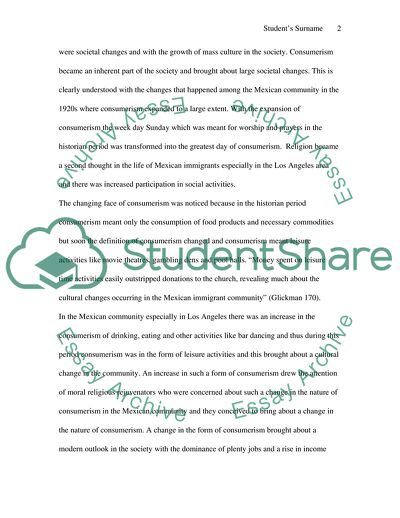
- Home
- Free Samples
- Premium Essays
- Editing Services
- Extra Tools
- Essay Writing Help
- About Us
- Studentshare
- Subjects
- Miscellaneous
- American Consumer Society
American Consumer Society - Essay Example

- Subject: Miscellaneous
- Type: Essay
- Level: Masters
- Pages: 4 (1000 words)
- Downloads: 0
- Author: qlabadie
Extract of sample "American Consumer Society"
George Sanchez in the article ‘familiar sounds of change: music and the growth of mass culture’ pointed out that changes in the nature of consumerism were noticed when there were societal changes and with the growth of mass culture in the society. Consumerism became an inherent part of the society and brought about large societal changes. This is clearly understood with the changes that happened among the Mexican community in the 1920s where consumerism expanded to a large extent. With the expansion of consumerism the week day Sunday which was meant for worship and prayers in the historian period was transformed into the greatest day of consumerism.
Religion became a second thought in the life of Mexican immigrants especially in the Los Angeles area and there was increased participation in social activities. The changing face of consumerism was noticed because in the historian period consumerism meant only the consumption of food products and necessary commodities but soon the definition of consumerism changed and consumerism meant leisure activities like movie theatres, gambling dens and pool halls. “Money spent on leisure time activities easily outstripped donations to the church, revealing much about the cultural changes occurring in the Mexican immigrant community” (Glickman 170).
In the Mexican community especially in Los Angeles there was an increase in the consumerism of drinking, eating and other activities like bar dancing and thus during this period consumerism was in the form of leisure activities and this brought about a cultural change in the community. An increase in such a form of consumerism drew the attention of moral religious rejuvenators who were concerned about such a change in the nature of consumerism in the Mexican community and they conceived to bring about a change in the nature of consumerism.
A change in the form of consumerism brought about a modern outlook in the society with
...Download file to see next pages Read MoreCHECK THESE SAMPLES OF American Consumer Society
Needs and Wants in American Society
The Effect Of Advertising On Men As Consumers From 1880-1930 And Its Impact On American Culture
Is Third World Immigration a Threat to America's Way of Life
Affluent Society in the United States
Consumer Culture - Americans Values and Lifestyles
How Has American Society Become Consumer-Oriented
Consumer Society
Key ASpects of Consumer Culture

- TERMS & CONDITIONS
- PRIVACY POLICY
- COOKIES POLICY